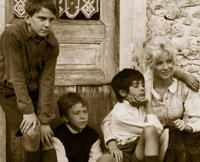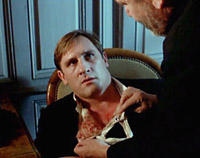I never did blog the other Maurice Pialat films I saw, so I may as well catch up now. You may recall that the series began with an early film of his that showcased his talent for directing children, which I enjoyed, followed by a couple of mid-career films that focused on illicit sexual behaviour, which I didn’t really get into. That duality continued in the latter part of the series.
 Soon after producing his first feature film, Pialat produced a seven-part mini-series called House in the Woods (1971), about a rural family that looks after other people’s children during the First World War. We have seen so many movies about the trenches, the trenches, the trenches that it was really interesting to see a film set in France in which the war itself seems to happen almost entirely off-stage. One episode does end with a biplane crashing into a field, but even here, the focus is not so much on the “action” as it is on the aftermath, and the sense that the world goes on even after all the seemingly important and exciting stuff has come to pass; the episode ends with a single, lonely soldier standing guard by the wreckage. I noticed that a number of scenes ended with the camera lingering on an empty set after all the characters had passed through; e.g., the townsfolk celebrate the end of the war by marching through the streets, and after they have all walked by, the camera stays on the empty street for just a few seconds longer than you might have expected. As with individual scenes, so with the series as a whole: the story seems to come to an end with the sixth episode, as all the children leave the little house where they have spent the war, and everything seems so final that, during the intermission, I asked the theatre staff if maybe they had got the reels mixed up; but no, it turns out the seventh episode takes place mainly in the big city, as one child tries to adjust to his new, “normal” life. FWIW, Pialat himself plays the village schoolteacher, and his facility with children is certainly on display here; so is his mastery of ensemble casts and naturalistic direction. I’d like to see this series again some time, but I’m not sure how that would be possible.
Soon after producing his first feature film, Pialat produced a seven-part mini-series called House in the Woods (1971), about a rural family that looks after other people’s children during the First World War. We have seen so many movies about the trenches, the trenches, the trenches that it was really interesting to see a film set in France in which the war itself seems to happen almost entirely off-stage. One episode does end with a biplane crashing into a field, but even here, the focus is not so much on the “action” as it is on the aftermath, and the sense that the world goes on even after all the seemingly important and exciting stuff has come to pass; the episode ends with a single, lonely soldier standing guard by the wreckage. I noticed that a number of scenes ended with the camera lingering on an empty set after all the characters had passed through; e.g., the townsfolk celebrate the end of the war by marching through the streets, and after they have all walked by, the camera stays on the empty street for just a few seconds longer than you might have expected. As with individual scenes, so with the series as a whole: the story seems to come to an end with the sixth episode, as all the children leave the little house where they have spent the war, and everything seems so final that, during the intermission, I asked the theatre staff if maybe they had got the reels mixed up; but no, it turns out the seventh episode takes place mainly in the big city, as one child tries to adjust to his new, “normal” life. FWIW, Pialat himself plays the village schoolteacher, and his facility with children is certainly on display here; so is his mastery of ensemble casts and naturalistic direction. I’d like to see this series again some time, but I’m not sure how that would be possible.
 After that, it was back to the 1980s and Pialat’s collaboration with Gerard Depardieu. Police (1985) co-stars Depardieu as a bigoted cop and Sophie Marceau, who was then only 18 and who vowed never to work with Pialat again, as a woman who is involved with Tunisian drug dealers and who begins to play on the cop’s affections even after all the psychological bullying he gives her down at the police station; Sandrine Bonnaire also appears as one of the local prostitutes. The screenplay was based on a story by Catherine Breillat, who is known for sexually obsessed films of her own like Fat Girl (2001; my review), and there are moments where the film takes politically incorrect pokes at the rise of feminism (the male detectives taunt their female counterparts, and when one of them is slapped by a male civilian, the male cops fail to come to her defense, telling her to forget it), but the most provocative thing about this film is probably its portrayal of ethnic tensions in France — something that continues to make the news, and thus makes this film seem as timely as ever.
After that, it was back to the 1980s and Pialat’s collaboration with Gerard Depardieu. Police (1985) co-stars Depardieu as a bigoted cop and Sophie Marceau, who was then only 18 and who vowed never to work with Pialat again, as a woman who is involved with Tunisian drug dealers and who begins to play on the cop’s affections even after all the psychological bullying he gives her down at the police station; Sandrine Bonnaire also appears as one of the local prostitutes. The screenplay was based on a story by Catherine Breillat, who is known for sexually obsessed films of her own like Fat Girl (2001; my review), and there are moments where the film takes politically incorrect pokes at the rise of feminism (the male detectives taunt their female counterparts, and when one of them is slapped by a male civilian, the male cops fail to come to her defense, telling her to forget it), but the most provocative thing about this film is probably its portrayal of ethnic tensions in France — something that continues to make the news, and thus makes this film seem as timely as ever.
 And then, after all that, finally the film I had been waiting for — Under the Sun of Satan (1987), a film about troubled faith based on a novel by Georges Bernanos, who also wrote the stories that became the basis for Robert Bresson’s Diary of a Country Priest (1951) and Mouchette (1967). The film stars Depardieu as a priest whose encounter with a murdering adulteress played by Bonnaire — and with a figure who appears to be Satan himself — convinces him that this world is ruled by the devil, and I have to say I would probably have to see the film again before I could comment much on it. Suffice to say I was relieved to see that this was probably the least sex-obsessed of Pialat’s films since, well, House in the Woods. And FWIW, quite coincidentally, when I came home after the movie, my wife decided to watch Diary of a Country Priest — and I couldn’t join her, as one Bernanos story per evening was quite enough!
And then, after all that, finally the film I had been waiting for — Under the Sun of Satan (1987), a film about troubled faith based on a novel by Georges Bernanos, who also wrote the stories that became the basis for Robert Bresson’s Diary of a Country Priest (1951) and Mouchette (1967). The film stars Depardieu as a priest whose encounter with a murdering adulteress played by Bonnaire — and with a figure who appears to be Satan himself — convinces him that this world is ruled by the devil, and I have to say I would probably have to see the film again before I could comment much on it. Suffice to say I was relieved to see that this was probably the least sex-obsessed of Pialat’s films since, well, House in the Woods. And FWIW, quite coincidentally, when I came home after the movie, my wife decided to watch Diary of a Country Priest — and I couldn’t join her, as one Bernanos story per evening was quite enough!
Alas, family obligations, a friend’s wedding, and other things prevented me from seeing Graduate First (1978), Van Gogh (1991) and Le Garçu (1995), which is a shame, since only one of those is available on video here. For now, at any rate.












